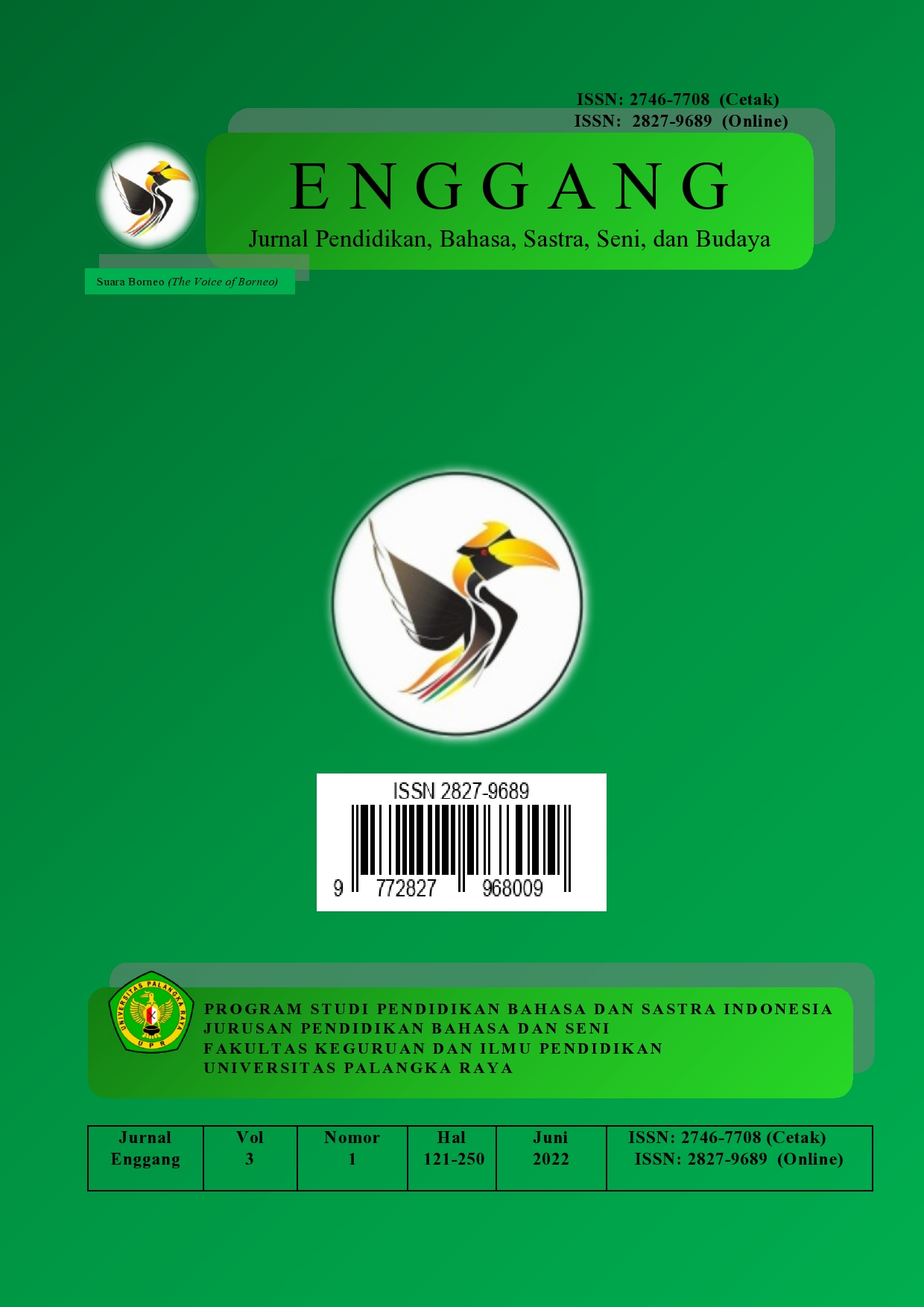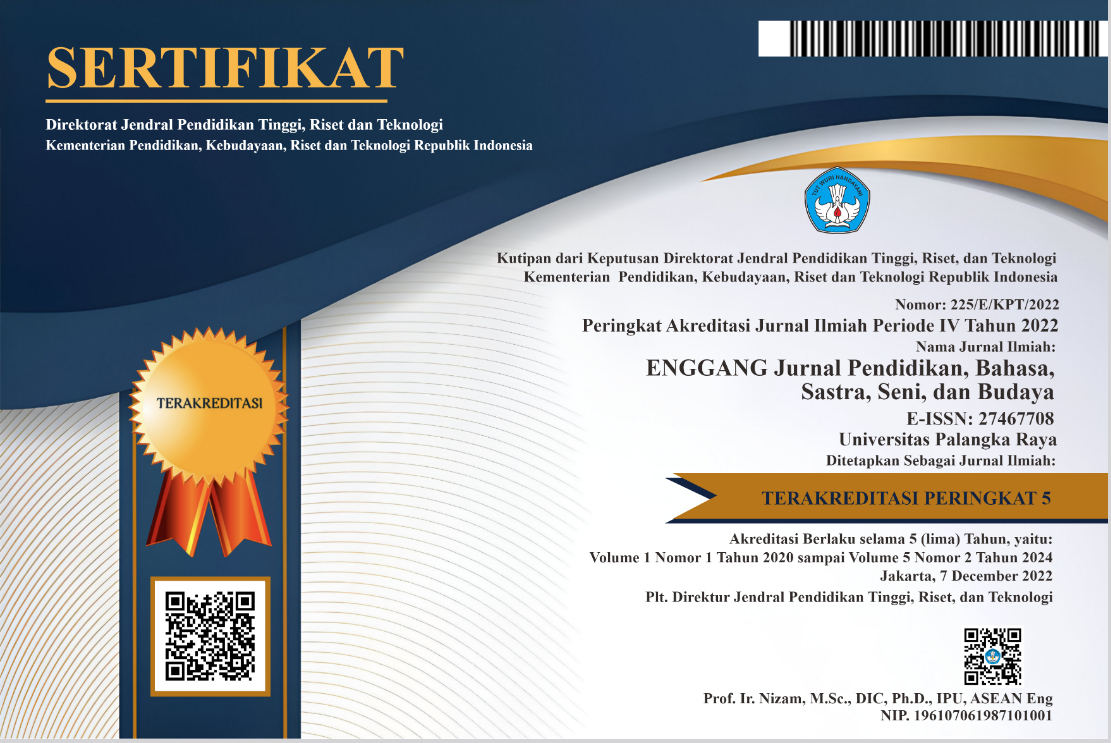The Effectiveness of Using Flashcard to Improve the Vocabulary Mastery of Eight Grade Students at SMPN 38 Palembang
DOI:
https://doi.org/10.37304/enggang.v5i2.21656Keywords:
Reading Comprehension, Flashcard, Team-Assisted individualizationAbstract
Mastering Vocabulary played a pivotal role in learning English, as it comprised a collection of words that, when used, construct meaningful sentences. Consequently, the more words a student masters, the more effortlessly they could construct sentences and effectively communicate their thoughts. The purpose of the study was to determine the level of use of flashcards in improving student vocabulary and to find out the use of flashcards can provide a significant difference in the mastery of vocabulary of students who use flashcards and those who do not use flashcards among 8th grade students of SMP 38 Palembang. The quantitative technique was used for this study research. The sample of this research VIII.5 and VIII.6 class, each class consisted of 34 students, with a total sample of 68 students. Additionally, the result of an independent sample t-test revealed that at a significance level of 0,05, t-obtained was 6,320 > t-table (df=66) was 1,997. It denoted that experimental and control group means significantly differed. After having the results of the t-test it can be concluded that team- assisted individualization was useful and applicable for enhancing students’ mastery of English vocabulary among eighth-grade students at SMP Negeri 38 Palembang.
Downloads
References
Afzal, N. (2019). A study on vocabulary-learning problems encountered by BA English majors at the university level of education. Arab World English Journal (AWEJ), 10(3), 81–98.
Amalia, T. Z. (2018). Flashcards in language area of early childhood education. ThufuLA: Jurnal Inovasi Pendidikan Guru Raudhatul Athfal, 2(1), 111–126.
Aprilani, D. N., & Suryaman, M. (2021). Students’ perception in learning English vocabulary through Quizlet. JET: Journal of English Teaching, 7(3), 343–353.
Creswell, J. W. (2014). Research method: Qualitative, quantitative, and mixed methods approaches (4th ed.). Sage Publications.
Herlina, & Dewi, R. R. (2017). Flashcard media: The media for developing students’ understanding for English vocabulary at elementary school. IJER: Indonesian Journal of Educational Review, 4(1), 116–128.
Jumiarti, A., Aprizani, Y., & Haura, R. (2020). The effectiveness of flashcard in teaching vocabulary at the grade of SMPN 5 Alalak school year 2019/2020. Proceeding of SHEPO 2020, 56–62.
Misnawati, M., Poerwadi, P., Veniaty, S., Nurachmana, A., & Cuesdeyeni, P. (2022). The Indonesian language learning based on personal design in improving the language skills for elementary school students. Multicultural Education, 8(2), 31–39.
Rao, X. (2019). Learning theories that impact English teaching and learning. In University English for Academic Purposes in China. https://doi.org/10.1007/978-981-13-0647-1
Ratnawati, P. D., Yulianti, A., & Emeliana, D. (2021). English learning innovation using flash card media to improve students’ understanding of vocabulary and pronunciation. The 14th University Research Colloquium 2021, 27–35.
Richard, J. C., & Schmidt, R. (2010). Longman dictionary of language teaching and applied linguistics (4th ed.). Longman.
Sugiyono. (2016). Metode penelitian kuantitatif, kualitatif, dan R&D. Alfabeta.
Akbar, F. (2022). Effective vocabulary teaching strategies in EFL classrooms. Pustaka Pelajar.
Arsyad, A. (2010). Media pembelajaran. RajaGrafindo Persada.
Sudjana, N., & Rivai, A. (2013). Media pengajaran. Sinar Baru Algensindo.
Adwin, R. (2003). Improving English vocabulary through flashcards: Teaching strategy for beginners. Yogyakarta: Media Edukasi.
Yanto, R., & Lestari, A. (2020). Pengaruh media kartu kata terhadap penguasaan kosakata siswa SD. Jurnal Pendidikan Dasar, 12(2), 105–114.













